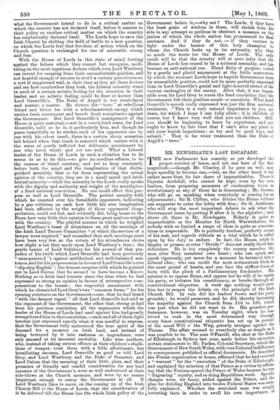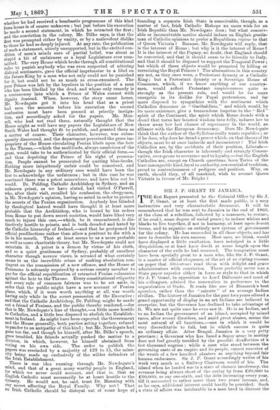MR. NEWDEGATE'S LAST ESCAPADE.
THE new Parliament has scarcely as yet developed the proper number of bores, and not one bore of the first magnitude,—though Mr. Charley, if he goes on well, may hope speedily to become one,—but, on the other hand, it has rather more than its fair share of impracticables. There is Captain Archdall, who cannot be kept, even by his own leaders, from proposing measures of confiscation twice as revolutionary as any of those he is denouncing ; Mr. Greene, who will go on speaking when everybody is craving for an adjournment ; Sir R. Clifton, who divides the House without one supporter to enter the lobby with him ; Sir G. Jenkinsom who will stop the most important debate to ask what the Government mean by putting B after A in the alphabet ; and, above all, there is Mr. Newdegate. Nobody is quite so impracticable as the Member for North Warwickshire, for nobody with so limited a range of ideas is quite so eonscientious or respectable. He is perfectly fearless, perfectly secureof his seat, and regards ridicule as a trial which he is called upon by his duty to endure. In fact, the House, while it laughs, or groans, or cries " Divide !" does not really think him ridiculous. He is too completely the county member, the man after Tory members' own heart ; who can speak, and speak vigorously, yet never for a moment be betrayed into a Liberal idea ; who can credit the most acrimonious libels in the most genial of hearts, and can face the stiffest fence of facts with the pluck of a Parliamentary fox-hunter. His mission is to oppose Rome, and oppose her he will, if he upsets his party, or irritates his constituency, or breaks through all constitutional etiquettes. A week ago nothing would serve him but to reopen the debate on the principle of the Irish Church Bill. In vain did his leaders frown and his party grumble ; he would persevere, and he did, thereby increasing the majority against the Church from 118 to 123, which was just what he did not want to do. His grandest performance, however, was on Tuesday night, when he contrived to rush in the most determined way through every fence constitutional etiquette has set up in pursuit of his usual Will o' the Wisp, priestly intrigue against the Throne. The affair seemed to everybody else as simple as ft was possible to be. The man O'Farrell, who shot at the Duke of Edinburgh in Sydney last year, made before his execution certain statements to Mr. Parkes, Colonial Secretary, which the Government of New South Wales, with true Colonial indifference to consequences, published as official documents. He described the Fenian organization at home, affirmed that he had received a " warrant " for the " execution " of the Duke of Edinburgh, and explained the selection of that Prince as a victim by affirming that the Fenians spared the Prince of Wales because he was " disgracing " royalty, and so doing Republican work. Specthc charges were, we fancy, added against the Prince, and the plan for dividing England into twelve Federal States was carefully explained. Whether the wretched man was simPlY inventing facts in order to swell his own importance, or whether he had received a bombastic programme of this kind from home is of course unknown ; but just before his execution he made a second statement, in which he retracted the first ; and the conviction in the colony, Mr. Mike says, is that the first was prompted either by vanity, or by a malevolent dislike to those he had so deeply injured. At any rate, the publication of such a statement, utterly unsupported, but in the excited condition of men's minds sure of partial belief, was about as stupid a bit of unfairness as a loyal Legislature ever committed. The very House which broke through all constitutional rules to punish anybody who was even suspected of uttering disloyal sentiments, gave the official imprimatur to a libel on the future King by a man who not only could not be punished for it, but could not be so much as cross-examined. The poor Prince was left by the loyalists in the position of a man who has been libelled by the dead, and whose only remedy is a controversy into which a Prince of Wales cannot with dignity descend. When, however, the story came home, Mr. Newdegate got it into his head that as a priest had seen the assassin before his execution the second confession must have been penned at priestly instigation, and accordingly asked for the papers. Mr. Monsell, who had not read them, naturally thought that the House might as well have any papers the Legislature of New South Wales had thought fit to publish, and granted them as a matter of course. Their character, however, was subsequently discovered, and the department perceived the gross impropriety of the House circulating Fenian libels upon the heir to the Throne,—which the multitude, always suspicious of the great, would take to be authenticated by their official form,— and thus depriving the Prince of his right of prosecution. People cannot be prosecuted for quoting blue-books. Nothing more iniquitously unfair could be conceived, and Mr. Newdegate in any ordinary case would have been the first to acknowledge the unfairness ; but in this case he was convinced there was a priest somewhere, and have him out he would. Dr. Polding, Catholic Archbishop in Sydney, and an unknown priest, as we have stated, had visited O'Farrell, who, after their visit, recalled his confession, the clergymen, in Mr. Newdegate's opinion, having so acted in order to protect the secrets of the Fenian organization. Anybody less blinded by theological hatred would have thought it at least more probable that the Archbishop, who is bound by his orders from Rome to put down secret societies, would have liked very much to injure this one,—which, be it remembered, is distinctively hostile to priests, and is both dreaded and hated by the Catholic hierarchy of Ireland,—and that he postponed his official predilections rather than allow a penitent to die with a he in his mouth. That at least seems to us a more probable as well as more charitable theory, but Mr. Newdegate could not entertain it. A priest is a demon by virtue of his cloth, and so a quiet gentleman of Sydney, probably of excellent character though narrow views, is accused of what certainly seems to us the incredible crime of making absolution contingent on the commission of a new offence, and the House of Commons is solemnly required by a serious county member to pay for the official republication of retracted Fenian calumnies against the heir to the Throne. Every constitutional etiquette and every rule of common fairness was to be set aside, in order that the public might have a new account of Fenian plans, which, if it were worth anything at all, was worth having only while in the secret possession of the Executive : and that the Catholic Archbishop, Dr. Polding, might be made out a friend of Fenians, and the public thereby rendered,—for this is Mr. Newdegate's line of thought,—a little more hostile to Catholics, and a little less disposed to abolish the Establishment in Ireland. As might have been expected, the Government and the House generally, both parties acting together, refused to pander to an antipathy of this kind ; but Mr. Newdegate had gone too far, and though he himself, after Mr. Dilke's speech, grew troubled, his friends actually pushed the matter to a division, in which, however, he himself abstained from
Toting on his own side. The order to publish the Papers was rescinded by a majority of 123 to 15, the minority being made up exclusively of the wilder defenders of the Irish Establishment. There is one idea running through Mr. Newdegate's mind, and that of a great many worthy people in England, for which we never could account, and that is, that an English Catholic must necessarily be at heart hostile to the dynasty. He would not, he said, trust Dr. Manning with any secret affecting the Royal Family. Why not ? That an Irish Catholic should be disloyal out of some hope of founding a separate Irish State is conceivable, though, as a matter of fact, Irish Catholic Bishops no more wish for an Irish Republic than Mr. Newdegate does ; but what conceivable or inconceivable motive should induce an English gentleman of Catholic opinions to prefer a Republican regime to that of Queen Victoria ? Because, Mr. Newdegate will reply, that is the interest of Rome ; but why is it the interest of Rome It is the interest of the Papacy, no doubt, that England should be converted, and that it should cease to be friendly to Italy, and that it should be disposed to support the Temporal Power ; but which of these objects would be promoted by killing or terrorizing the Royal Princes ? The alternatives in this country are not, as they once were, a Protestant dynasty or a Catholic Ting; but a Protestant dynasty or a Sovereign House of Commons, which, if we know anything of our countrymen, would reflect Protestant suspiciousness quite as strongly as the present rule, and would be far more energetic in its dislike for Papal pretensions, and far more disposed to sympathize with the sentiment which Catholics denounce as Garibaldism," and which would, by its mere existence, give a tremendous impetus to the " Red " spirit of the Continent, the spirit which Rome dreads with a dread that turns her boasted wisdom into folly, induces her to throw away her last chance of supremacy in the world, an alliance with the European democracy. Does Mr. Newdegate think that the author of the Syllabus really wants republics ; or if he does, why does he dread a power which, on that theoryof its objects, must be at once imbecile and inconsistent ? The Irish Catholics are, by the accidents of their position, Liberals— though the Irish character is inherently and strongly Conservative, over-prone to reverence and to loyalty,—but the English Catholics are, except on Church questions, born Tories of the least manageable kind, loyal to authority, reverential of tradition, proud to contentiousness of pedigree and position. Why, on earth, should they, of all mankind, wish to overact Queen Victoria in favour of Mr. Bright ?































 Previous page
Previous page